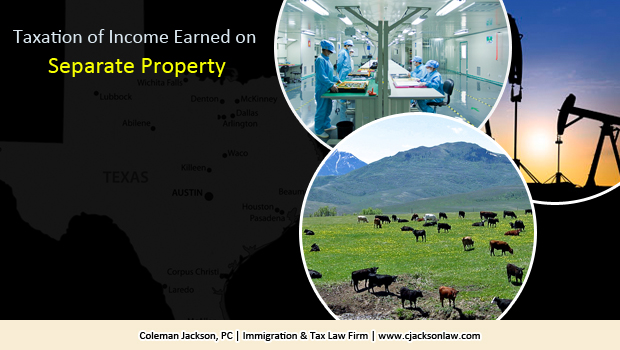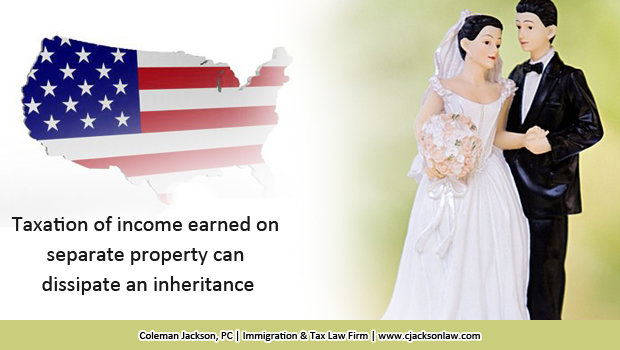Taxation of Income Earned on Separate Property
By: Coleman Jackson, Tax Attorney & Certified Public Accountant
December 12, 2015
Texas is a community property state. Increments of wealth earned on separate property are community property. The general tax rule is that increments of wealth on separate property during marriage, such as interest income earned by either spouse, is community property and one-half of it is taxed to each spouse accordingly. It does not matter which spouse earned it or who exercised possession and control over it. It is irrelevant which spouse actually received the income earned on separate property. But equal communal responsibility sometimes is not a just result, and it does not always yield the right tax outcome. 26 U.S.C. §66 (The Internal Revenue Code) delineate several circumstances where a spouse could be relieved of federal tax liability related to increments of wealth on separate property as follows:
a) Two individuals married to each other but lives apart during the entire tax year, if
- Couple does not file a joint tax return; and
- Couple does not transfer between themselves any part of the community income; or
b) One spouse acted as if solely entitled to the community income and failed to notify the other spouse before the tax return due date, including extensions for filing the tax return for the taxable year of the nature and amount of the undisclosed income earned on separate property; or
c) Spouses does not file a joint tax return for the tax year and the following facts can be established:
- Innocent spouse does not include an allocation of income in their personal tax return properly allocable to the other spouse pursuant to IRC 879(a);
- Innocent spouse establishes by facts and circumstances that (s)he did not know of, and had no reason to know of, the income earned on separate property; and
- Innocent spouse establishes by facts and circumstances that it’s inequitable include its share of this community income in the innocent spouse’s gross income.
Many folks, especially immigrants fresh to America, can be quite surprised by the complicated, intricate, intertwining system of laws that could impose federal and state taxes upon them for property owned by their spouses prior to marriage- indeed owned prior to their coming to the United States. Taxation of income earned on separate property can dissipate an inheritance. A Last Will & Testament will not fix these taxing anomalies unless the testator by unequivocal language directs that a tax be paid out of its estate rather than by its beneficiaries. Without precise language in the Will, the courts will not assume by implication that the testator intended to make a gift. See Stewart v. Selder, 473 S.W.2d 3 (Tex. 1971). Courts will not rewrite a bad Last Will & Testament; nor will the Courts write a Last Will & Testament for someone who dies intestate.
In Texas, increments of wealth earned on separate property are community property. Who pays the tax depends upon whether the couple engages in proper estate planning. What do you have, and who do you want to give it to? Immigrants who come to the United States unconcerned with the tax consequences imposed by the federal and state governments on increments of wealth generated on separate property owned prior to their marriage and immigration into the United States could unnecessarily dissipate their inherited estate.
This gift and estate tax law blog is written by the Tax & Immigration Law Firm of Coleman Jackson, P.C. for educational purposes; it does not create an attorney-client relationship between this law firm and its reader. You should consult with legal counsel in your area with respect to any specific immigration, estate and tax issues or your particular set of circumstances impacting you, your family or business succession.
Coleman Jackson, P.C. | Immigration & Tax Law Firm | English (214) 599-0431| Spanish (214) 599-0432



